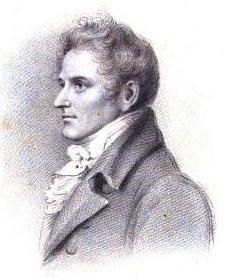Sir John Carr on:
[Wikipedia]
[Google]
[Amazon]
Sir John Carr (1772–1832) was an English barrister and (travel) writer.

 In 1808 there appeared ''Caledonian Sketches, or a Tour through Scotland in 1807'', reviewed by
In 1808 there appeared ''Caledonian Sketches, or a Tour through Scotland in 1807'', reviewed by

Life
Carr, fromDevon
Devon ( , historically known as Devonshire , ) is a ceremonial and non-metropolitan county in South West England. The most populous settlement in Devon is the city of Plymouth, followed by Devon's county town, the city of Exeter. Devon is ...
shire, was called to the bar at the Middle Temple
The Honourable Society of the Middle Temple, commonly known simply as Middle Temple, is one of the four Inns of Court exclusively entitled to call their members to the English Bar as barristers, the others being the Inner Temple, Gray's Inn an ...
, but for health reasons began to travel. Accounts of his journeys around Europe were popular for their light style.
Shortly after the publication of ''The Stranger in Ireland'' (1806), Carr was knighted by John Russell, 6th Duke of Bedford, then Lord Lieutenant of Ireland
Lord Lieutenant of Ireland (), or more formally Lieutenant General and General Governor of Ireland, was the title of the chief governor of Ireland from the Williamite Wars of 1690 until the Partition of Ireland in 1922. This spanned the Kingdo ...
. In 1807 his ''Tour in Ireland'' was made the subject of a spoof by Edward Dubois, entitled ''My Pocket Book, or Hints for a Ryghte Merrie and Conceited Tour''. The publishers were prosecuted in 1809, but Carr was nonsuited. Lord Byron
George Gordon Byron, 6th Baron Byron (22 January 1788 – 19 April 1824), known simply as Lord Byron, was an English romantic poet and Peerage of the United Kingdom, peer. He was one of the leading figures of the Romantic movement, and h ...
met Carr at Cadiz, and referred to him in some suppressed stanzas of ''Childe Harold
''Childe Harold's Pilgrimage'' is a long narrative poem in four parts written by Lord Byron. The poem was published between 1812 and 1818. Dedicated to " Ianthe", it describes the travels and reflections of a world-weary young man, who is disi ...
'' as "Green Erin's knight and Europe's wandering star".
Carr died in New Norfolk Street, London, on 17 July 1832.
Works
In 1803 Carr published ''The Stranger in France, a Tour from Devonshire to Paris'', an immediate success. It was followed in 1805 by '' A Northern Summer: or, Travels round the Baltic, through Denmark, Sweden, Russia, Prussia and Part of Germany In The Year 1804''; in 1806 by ''The Stranger in Ireland, or a Tour in the Southern and Western parts of that country in 1805'', and in 1807 by ''A Tour through Holland, along the right and left banks of the Rhine, to the south of Germany, in 1806''. In 1808 there appeared ''Caledonian Sketches, or a Tour through Scotland in 1807'', reviewed by
In 1808 there appeared ''Caledonian Sketches, or a Tour through Scotland in 1807'', reviewed by Sir Walter Scott
Sir Walter Scott, 1st Baronet (15 August 1771 – 21 September 1832), was a Scottish novelist, poet, playwright and historian. Many of his works remain classics of European and Scottish literature, notably the novels '' Ivanhoe'', '' Rob Roy' ...
in the ''Quarterly Review
The ''Quarterly Review'' was a literary and political periodical founded in March 1809 by London
London is the capital and largest city of England and the United Kingdom, with a population of just under 9 million. It stands on the River ...
''; and in 1811 ''Descriptive Travels in the Southern and Eastern parts of Spain and the Balearic Isles in the year 1809''. Carr was also the author of:
*''The Fury of Discord, a poem'', 1803;
*''The Seaside Hero, a drama in three acts'', 1804 (about an anticipated invasion, scene set on the coast of Sussex
Sussex (), from the Old English (), is a historic county in South East England that was formerly an independent medieval Anglo-Saxon kingdom. It is bounded to the west by Hampshire, north by Surrey, northeast by Kent, south by the English ...
); and
*''Poems'', 1809.
Notes
;AttributionExternal links
* * * {{DEFAULTSORT:Carr, John 1772 births 1832 deaths English barristers English travel writers English male non-fiction writers